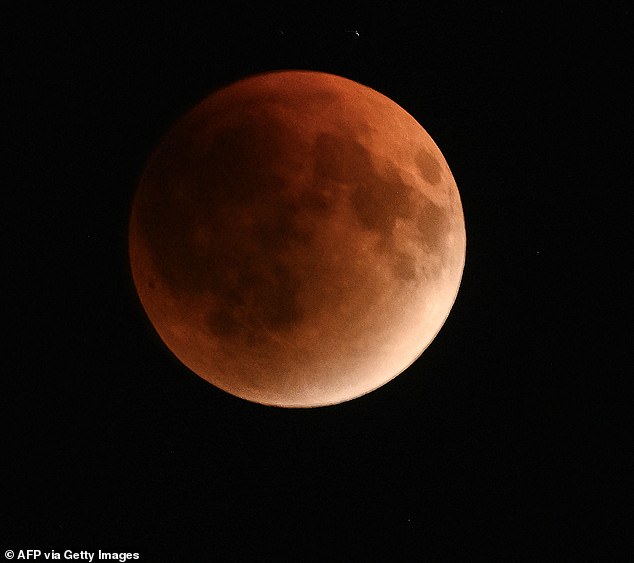[ad_1]
Millions are being captivated by a rare total lunar eclipse that is rising around the world tonight.
Sky watchers are amazed as the full moon turns red, known as a ‘Blood Moon’.
During a total lunar eclipse, Earth lines up between the moon and the sun, hiding the moon from sunlight.
As a result, the moon will turn a deep, dark red – hence the ‘blood moon’ title.
In the UK, the lunar eclipse will reach its peak at 19:33 BST, but people will only be able to see it after the moon rises.
As the moon will be low on the horizon, it might be quite difficult to see.
The Met Office recommends to boost your chances of a good sighting, try to find a high point with a clear view to the east to make the most of this eclipse.
In built-up areas like London, it is advised going to te top of a hill or popular viewing spots.

Millions are being captivated by a rare total lunar eclipse that is rising around the world tonight. Pictured over Islamabad, Pakistan

The ‘Blood Moon’ is seen over the roof of Yongdingmen Gate on the night of a total lunar eclipse in Beijing, China

A partial lunar eclipse is seen in the sky above a Turkish flag waving on the illuminated Ankara Castle in Ankara, Turkiye
However, you don’t have long to catch it, with the rare alignment ending less than three hours later, at 21:55 BST as the moon slowly moves out of the Earth’s shadow.
It takes place when the Earth lies directly between the sun and the moon, and the moon is in the shadow of Earth.
For a total lunar eclipse to happen, all three bodies must lie in a straight line.
‘When this happens, the only light that reaches the moon’s surface is from the edges of the Earth’s atmosphere,’ Royal Museums Greenwich explained.
‘The air molecules from Earth’s atmosphere scatter out most of the blue light.
‘The remaining light reflects onto the moon’s surface with a red glow, making the moon appear red in the night sky.’
For this lunar eclipse, the moon will rise above the horizon just in time to see the event from the UK.
Unlike a solar eclipse, it is safe to look at directly as the moon’s reflected light is not as bright.
[ad_2]
This article was originally published by a www.dailymail.co.uk . Read the Original article here. .

